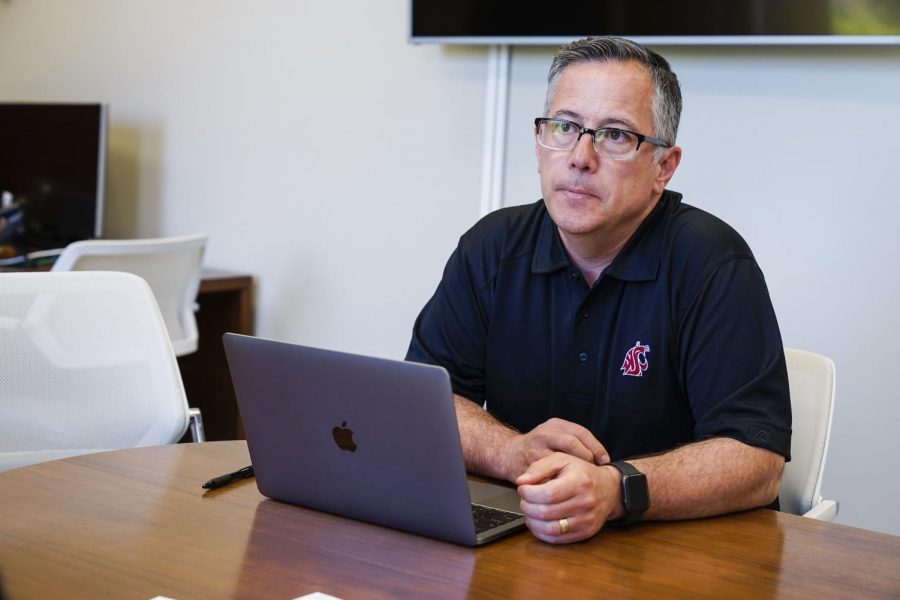Tuition increase of 2.4 percent across WSU campuses
Tuition increase to take effect fall 2019 semester, amounts will vary according to residency
WINSTON O'NEIL | THE DAILY EVERGREEN
hil Weiler, Vice President of Marketing & Communication at WSU, discusses the 2.4% tuition increase going into the fall 2019 semester.
June 20, 2019
WSU’s Board of Regents approved a 2.4 percent tuition increase earlier this month during a Tri-Cities campus retreat. The increase is supposed to aid graduate students’ and staff’s increased living expenses and health insurance.
Washington law allows universities to set tuition rates for their students excluding state residents. By law, tuition for undergraduate in-state students cannot be more than the average annual percentage growth rate in the median hourly wage for Washington in the past 14 years. This was determined to be 2.4 percent.
As of April 2019, the average rent for an apartment in Pullman was $891. Five years ago, average renters paid $691 in Pullman, according to recent housing trends.
Phil Weiler, vice president of marketing and communication, said Washington legislature approved a salary increase but did not completely provide the funds to implement the increase.
“So, [Washington state legislature] said, ‘Universities, we know you have the ability to raise money through tuition increases, so we want you to fill that gap with tuition increases,’ ” Weiler said.
Both resident and non-resident students will face the 2.4 increase next fall semester but will pay different amounts. For example, an undergraduate resident student enrolled in the global campus would pay an additional $233 next fall semester, according to the meeting agenda. A non-resident graduate student would pay $592 this following school year, according to the agenda.
Weiler mentioned that this tuition increase is the first in seven years. It is just simply keeping up with current expenses, he said.
“We have not increased tuition for graduate and non-resident students for seven years. It’s been a very long time since we’ve done that,” Weiler said. “You have to be competitive, particularly if we’re talking about students who are out of state. They need to believe that they’re getting a good enough value to come pay for those out-of-state rates.”
Typically, an out-of-state undergraduate student, whose tuition is $23,956, subsidizes an in-state student, Weiler said. The greater tuition for non-resident students helps cover salaries that couldn’t have been made with resident student tuition.
With faculty’s increased salaries, the school must also fund health benefits, Weiler said.
“Legislature said they want to give faculty, staff, graduate students a salary increase but there’s also a commensurate increase in [benefits],” Weiler said. “As your wages go up, your benefits have to go up as well.”
Darya Maysam, a sophomore majoring in animal science and mathematics, said she’d rather not have a new fee but would not mind once it’s in effect.
“I don’t have particularly strong feelings about it,” Maysam said. “Since it’s only a 2.4 percent increase, it doesn’t seem like it would make that much of a difference to me.”
As time goes on and with inflation rising, goods become more expensive, so she said it doesn’t seem surprising that the cost of tuition has also increased as part of this trend.
Maysam, however, said she is content that the revenue generated will help graduate students financially. She even thinks it could help recruit more graduate students.
“I think the tuition increase can be good in this sense and help students who are pursuing more advanced degrees,” Maysam said. “It could also encourage undergraduate students to go to graduate school since they would be receiving extra help from the money generated by this tuition increase.”





















